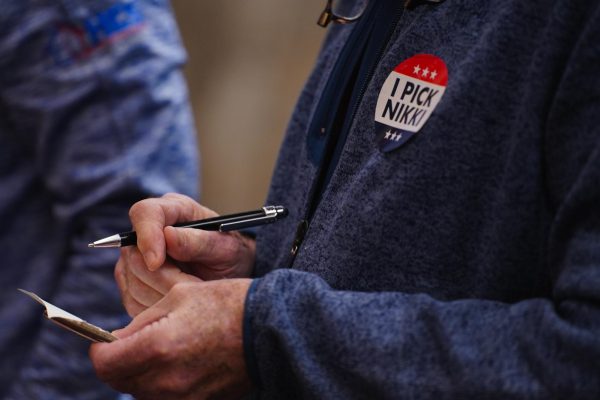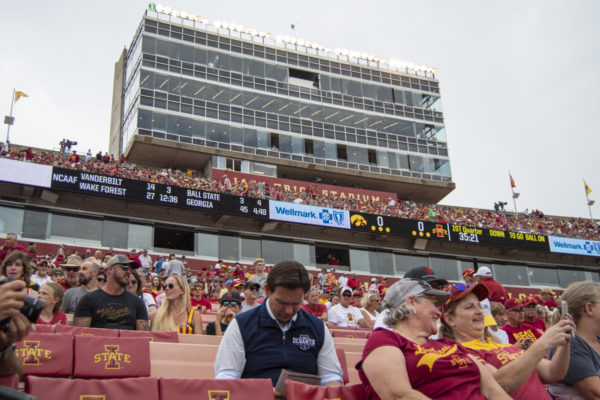Romney picks up win in Florida primary
Mitt Romney, former Republican governor of Massachusetts, meets with supporters during a campaign stop at Kinzler Construction in Ames on Thursday, Dec. 29. Romney was the projected winner in Flordia’s primary on Jan. 31.
January 31, 2012
Mitt Romney will win the Florida primary, CNN projected Tuesday in a result that will cement the front-running status of the former Massachusetts governor for the Republican presidential nomination.
With nearly half of the vote counted, Romney had about 47 percent of the tally, according to the Florida Department of State Division of Elections. Gingrich had garnered nearly 32 percent. Former Sen. Rick Santorum of Pennsylvania was in third, followed by U.S. Rep. Ron Paul of Texas.
To cheers of “Mitt, Mitt, Mitt,” Romney thanked his supporters for what he called a “great victory” just 30 minutes after the last polls closed.
“A competitive primary does not divide us, it prepares us,” Romney told supporters. “And we will win.”
As he has in the past, Romney took on President Barack Obama’s record on the economy and government spending.
“Without raising taxes I will finally get America to a balanced budget,” Romney said to cheers.
The projected victory gives Romney all 50 of Florida’s convention delegates, and more importantly, new momentum heading into a series of caucuses and primaries in the next month building up to Super Tuesday on March 6, when 10 states will hold nominating contests.
“I think the winner of Florida is in all likelihood going to be the nominee of our party,” said Florida Republican Sen. Marco Rubio. “Florida is a mini-America.”
In the final Florida poll of likely GOP primary voters, released earlier Tuesday by the American Research Group, Romney had a 12-point lead over Gingrich. The poll, conducted Sunday and Monday, has a margin of error of four percentage points.
More than 632,000 voters already cast absentee or early ballots as of Monday.
“The GOP contest may end in Florida, but that doesn’t mean it will be over,” said Alex Castellanos, a GOP strategist and CNN contributor, before the polls closed. “With a win, Romney puts the nomination firmly in his grip. But it appears Gingrich and Santorum will keep trying to rip it from his hand.”
“Romney’s relentless and disciplined effort should get more credit,” said Castellanos, who was a top media adviser for Romney’s 2008 nomination bid but is not taking sides this cycle. “No long passes, just three yards a play and a cloud of dust. But with a win on Tuesday, he’ll have gotten the nomination the old-fashioned way: He’ll have earned it.”
Gingrich held several events Tuesday, including a morning trip to the First Baptist Church of Windermere in Orlando, where he shook hands and took pictures with supporters. Romney held a mid-morning event at his Tampa headquarters.
The former House speaker stormed into Florida 10 days ago on a roll off of his double-digit victory over Romney and the rest of the field in the South Carolina primary.
But his momentum quickly faded after Romney’s campaign went on the offensive. Romney turned in two strong debate performances in the Sunshine State and unleashed a barrage of ads targeting Gingrich.
Negative ads accounted for 92 percent of political ads airing in Florida over the last week — a record rate for political campaigns, according to the Campaign Media Analysis Group, which tracks advertising content and spending.
“I spent much of my academic career telling reporters, ‘Relax, this is not the most negative campaign ever,'” CMAG President Ken Goldstein said. “Well, this is the most negative campaign ever.”
Romney told reporters Tuesday that he had learned his lesson from his South Carolina loss.
“If you’re attacked, I’m not going to just sit back,” he told reporters in Tampa, repeating a refrain he’s used regularly recently. “I’m going to fight back and fight back hard.”
On the day before the primary, Romney and Gingrich continued to clash, with Gingrich accusing Romney of dishonesty but conceding that a wave of attack ads by the former Massachusetts governor and his supporters had been effective.
“Frankly if all that stuff were true I wouldn’t vote for myself,” Gingrich said in Jacksonville on Monday, referring to what he called “dishonest” Romney ads.
The Romney campaign and an independent super PAC supporting his bid have greatly outspent Gingrich and pro-Gingrich super PACs on ad buys in Florida.
Romney acknowledged the turn to the negative, saying that his campaign was forced to respond to a negative salvo that helped Gingrich win in South Carolina.
And Romney said Gingrich’s vow during the weekend to take his presidential campaign all the way to the Republican convention is a sign of desperation.
“That’s usually an indication that you think you’re going to lose,” Romney told reporters on his campaign charter on Monday. “When you say ‘I’m going to go on no matter what happens,’ that’s usually not a good sign.”
Gingrich “has been flailing around a bit trying to go after me for one thing or the other,” Romney said later Monday to a crowd in Dunedin. “You just watch it and shake your head. It has been kind of painfully revealing to watch.”
While Romney and Gingrich were in Florida on Tuesday night to watch election returns, Santorum and Paul, knowing they’re out of the running for the 50 delegates, have moved on to the next contests.
Santorum campaigned in Colorado and Nevada, while Paul was in Maine during the weekend and was spending Tuesday in Colorado and Nevada.
Nevada’s caucuses take place Saturday, when Maine starts its weeklong caucuses.
Minnesota and Colorado hold their caucuses on Feb. 7, the same day that Missouri holds its non-binding primary.
The Paul and Santorum campaigns are strategically looking to states in which they can pick up delegates.
“Ultimately they’re conceding in advance in Florida, while trying to shore up future states,” said Doug Heye, a GOP strategist and Republican National Committee communications director. “Unfortunately for Paul and Santorum, that generally has not been a winning strategy. It’s not being done out of a position of strength.”

















